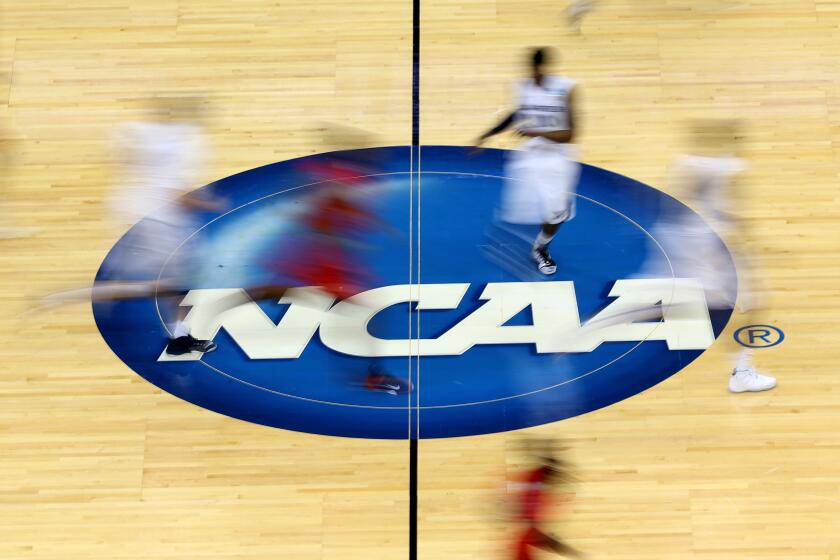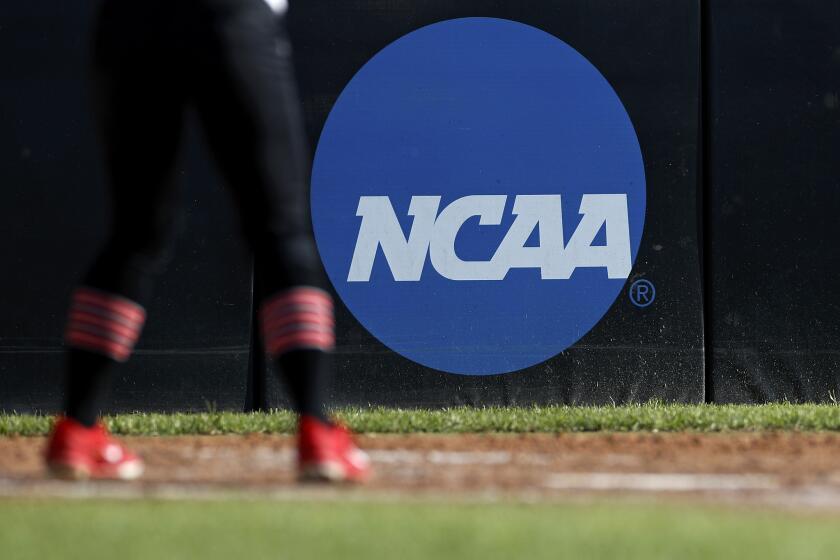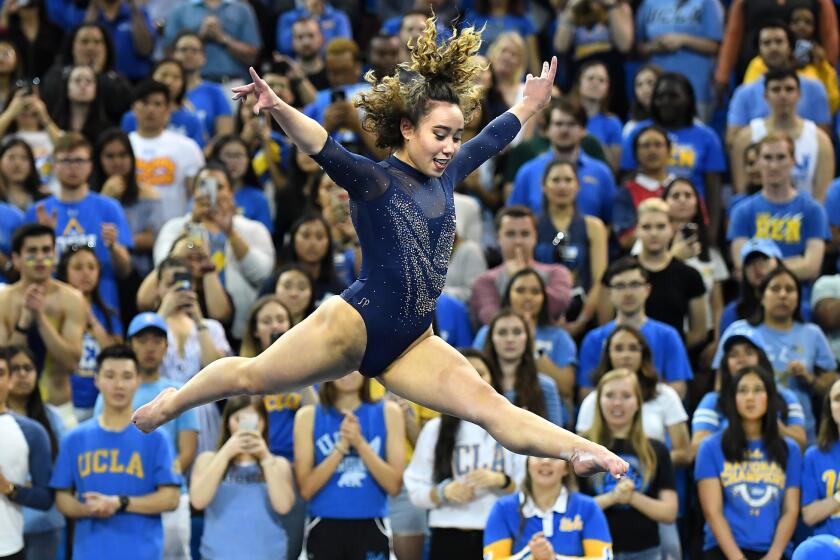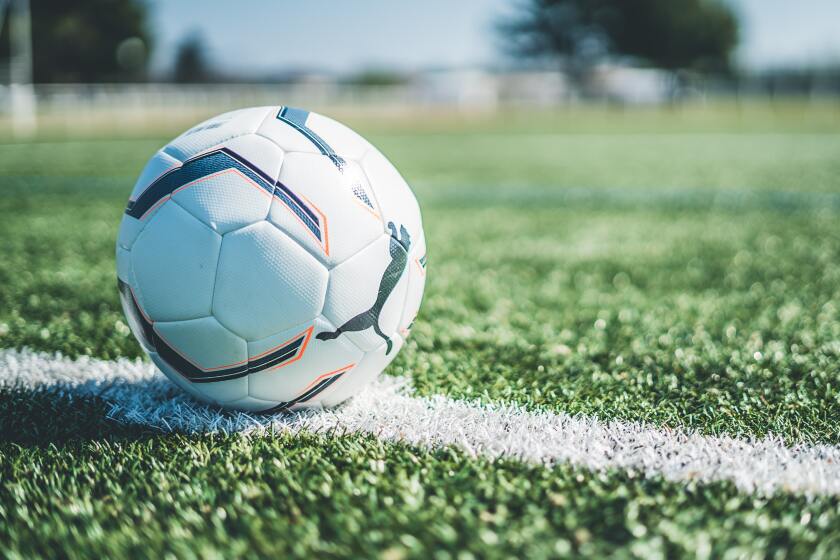Why wait on the NCAA to change? Meet the first company to link college athletes with sponsorships
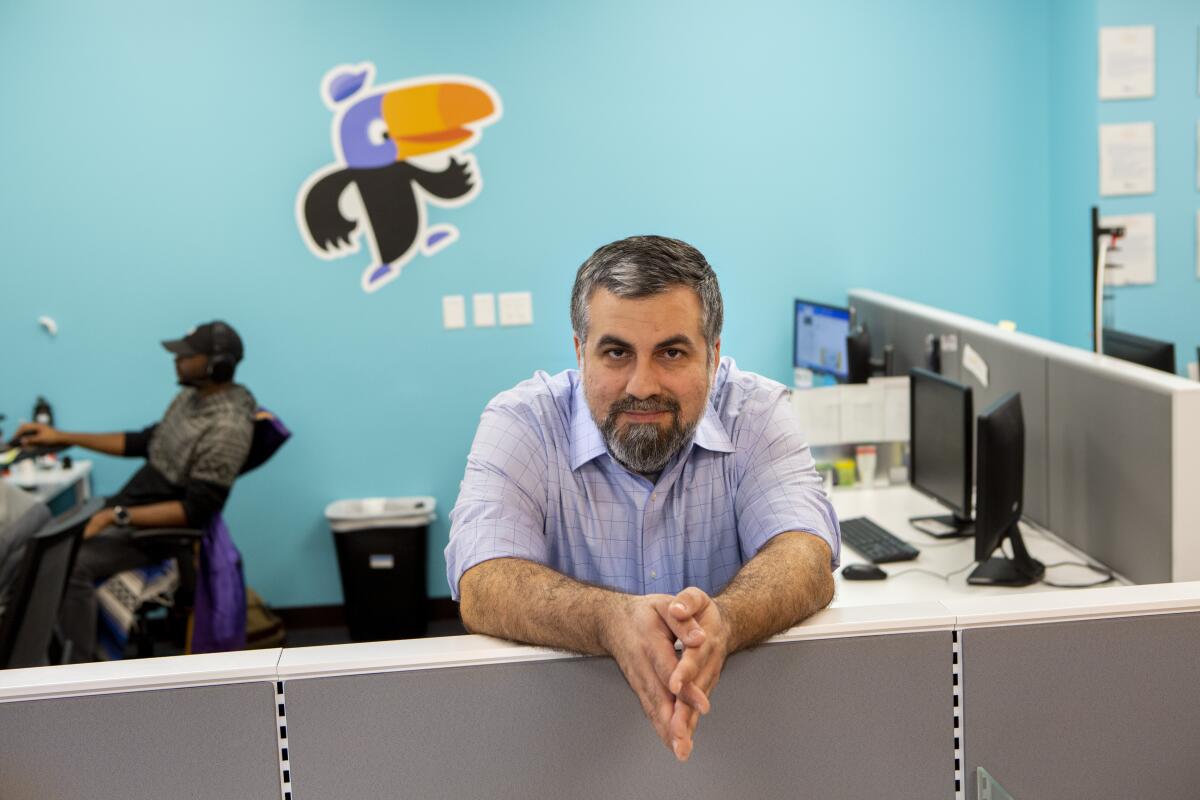
- Share via
From the moment California Gov. Gavin Newsom signed Senate Bill 206 into law in late September, paving the way for college athletes to profit from the use of their name, image and likeness through endorsements and other third-party agreements starting in 2023, speculation began as to how this brave new world might function.
For instance, would financial inducements from school boosters — offered and accepted under the table for decades, leading to NCAA infractions investigations for breaking the association’s “amateurism” rules — suddenly rise above board?
The image of a major donor paying a star athlete an inflated sum of cash to participate in an advertisement for a car dealership or the like was easily conjured as an example of how SB 206 would work. Of course, a free-market scenario in the recruitment of top prep athletes would represent a 180-degree turn from the current NCAA model, which limits the benefits an athlete can receive to the full cost of attending each university.
With mounting pressure from legislation being drafted in two dozen states and from growing interest from the U.S. Congress, it is unknown how far the NCAA will be forced to budge its bylaws on name, image and likeness or how long it will take to enact meaningful change.
But why wait on university presidents, politicians and bureaucrats to put forth a concrete framework for the future? That’s how Zachary Segal felt, anyway.
The Times obtained a document that provides a rare look into the unfiltered thoughts of college leaders on key issues facing the organization.
Last fall, after SB 206 became law, Segal, a Denver entrepreneur, founded StudentPlayer.com, a website that employs crowdfunding techniques to connect college athletes with sponsorship opportunities available at schools. In doing so, he created the first known company to take a theoretical concept for name, image and likeness compensation and bring it to life.
Segal ran his idea for the platform by Brad Basmajian, the chief operating officer of Toco Warranty Corporation. Segal is an investor in West Hills-based Toco, which sells vehicle repair coverage. Segal and Basmajian soon agreed: Who better than college athletes, with celebrity status among their fan bases and in some cases nationally, to become the faces and voices behind Toco’s message?
The company committed $100,000 to StudentPlayer.com.
Basmajian, a Fresno State football fan, wanted to show fairness in how he spread the company’s contribution. He decided to sponsor the starting quarterback position for each of the teams ranked in the top 10 at $10,000 per player, believing the loosening of NIL rules will lead to an emerging market in the world of digital advertising.
“The sheer fact that these laws have been proposed and passed are a direct reflection that there’s a strong value to the effect these players can have,” Basmajian said. “The distinction between college sports and professional sports is getting smaller and smaller every day. The fans of college sports are more rabid than pro sports, and the ability in this day and age of these players to reach out on their different social media platforms is bigger than it ever has been before. I think you’re going to see a lot of really strong social media influencers develop from this.”
Toco’s money, along with the smaller contributions StudentPlayer.com has received, will sit in an escrow account until name, image and likeness payments are approved by NCAA rules, Segal said.
“They’re held until a time when it’s legal and permissible to offer those funds to a student-athlete as a sponsorship opportunity,” Segal said. “We’re not trying to get in the way of existing rules. We’re just trying to be as responsive as possible to the legislation that’s passing and what we imagine moving forward.”
The NCAA and its 1,100 members are only beginning to use their collective imagination about how to handle writing new bylaws for regulating name, image and likeness. They would prefer that the rules remain in the spirit of the “collegiate model,” as laid forth by the NCAA Board of Governors in its October announcement that expressed an openness to modernize and further benefit college athletes.
This week at the NCAA convention in Anaheim, discussions on NIL have been the top priority. The stated hope is that new rules will be in place by January 2021.
Each NCAA division will decide where it is willing to land on a wide spectrum from only allowing NIL compensation for endeavors that are unrelated to athletic performance all the way to unfettered use of their NIL, which is the intention of California’s “Fair Pay to Play Act.”
As the NCAA places its efforts toward a federal, one-size-fits-all legislative solution in Washington, the association is likely to find a spot on the compensation spectrum that will be considered a political win by Congress.
Segal said that his site is prepared to work within the rules once they’re established.
On the surface, the plan to change rules on name, image and likeness use is a major turnabout by the NCAA. But those in favor of compensating athletes say there’s more to be done.
His background makes him an unlikely college sports visionary. Segal grew up in Montreal, attended Brown University for his bachelor’s and New York University for a dual law and business program. He is the first to acknowledge he is not a big college sports fan, but he did play ultimate Frisbee at Brown, where he marveled at how many hours the varsity athletes put in, even at an Ivy League school that does not offer athletic scholarships.
After California made the move toward allowing player compensation, Segal and his two older brothers hatched a plan.
At this early stage, here’s how StudentPlayer.com would work, using Toco Warranty’s 10 pledges to starting quarterbacks as the scenario:
The $10,000 isn’t promised to a specific recruit. It would be offered to the quarterback who wins the starting job for that season at, say, Baylor. That player would have been able to check StudentPlayer.com during his recruitment and see that benefit would be available to him if he were to become the starting quarterback and compare it to other benefits pledged to other schools, factoring that into his decision.
Baylor’s quarterback would then have the option of accepting the payment in exchange for doing a series of short ads for Toco Warranty from his various social media channels. From Basmajian’s perspective, that would fulfill his obligation to Toco.
“It’s such a unique way to empower these athletes as well as the schools and really kind of democratize the whole process,” Basmajian said.
The chair of the NCAA Division I council says the body is committed to drafting new proposals for regulating name, image and likeness of athletes by April.
“To expect players to post a quick video, talking about what we do, getting that word out to people we might not otherwise be able to reach, people who are driving vehicles and don’t have thousands in their pockets for unexpected repair, it’s a really easy ask on behalf of the player, something that won’t take his or her time but something that I think could have big benefits for the player and for us.”
The time element is important to Segal. He knows the NCAA wants to protect the long-held ideal of the “student-athlete,” and the more time a player spends working to earn money off their spotlight as a college athlete, the less time they will have to be a student.
“If the sponsors have obligations that were overly burdensome, you know, to run around to this car dealership and then to this pizza restaurant and to this alumni guy, it would just take up all their time, right?” Segal said.
Segal also stresses that StudentPlayer.com, by taking pledges to positions instead of to the players directly, will not lead to a wild, wild west where schools or boosters are trying to outbid each other leading into every year’s national signing day.
If a company wants to endow the Alabama starting quarterback position in exchange for a number of social media ads, that is a separate transaction that occurs once a player has signed with the school and earned the job.
“Our process leaves the recruitment and school decision largely as it is,” Segal said, “and is just providing more information. A student has to assess where he or she wants to go to school. A coach has to assess who he or she wants to play on their team. And the school has to assess who they want to admit to the school. And StudentPlayer would have no involvement with that.”
The conference won’t lose if students win, despite the NCAA scare tactics. The Pac-12 member schools should embrace their athletes’ rights and the opportunity to lead the way to the inevitable: an end to the false ideal of amateurism.
Most of StudentPlayer’s pledges have been small, likely contributed by fans and alumni of schools. Somebody donated $9 toward Auburn’s starting kicker. Northwestern’s starting quarterback, to this point, is worth $99, far less than those with Toco’s backing.
Non-football sports have received contributions, too. The players on the Minnesota-Mankato hockey team have been promised $110 to be spread equally among the roster.
On Dec. 13, 2019, Shane Drahota of Minnesota-Mankato’s athletic compliance department sent StudentPlayer.com a letter.
“It has been brought to our attention that your website has the potential to lead to NCAA eligibility issues with our student-athletes,” Drahota wrote. “As such, I am respectfully requesting that you remove all references to Minnesota State University, Mankato (MSU) and any student-athletes that represent MSU varsity athletic teams from your website.”
Segal responded on StudentPlayer.com four days later. In some ways, it was clear, the site’s proud founder could not help himself.
“A contribution made earlier this month was designated towards the future team members of MSU’s men’s ice hockey program,” Segal wrote. “This is exciting news for your school and its athletic department! We are surprised because it seems you don’t feel the same.
“Asking to have your university removed could be construed as an attempt to perpetuate the current system where student athletes benefit their school without the ability to earn compensation themselves. This model is bankrupt and we are not the only ones to think so.”
More to Read
Go beyond the scoreboard
Get the latest on L.A.'s teams in the daily Sports Report newsletter.
You may occasionally receive promotional content from the Los Angeles Times.

